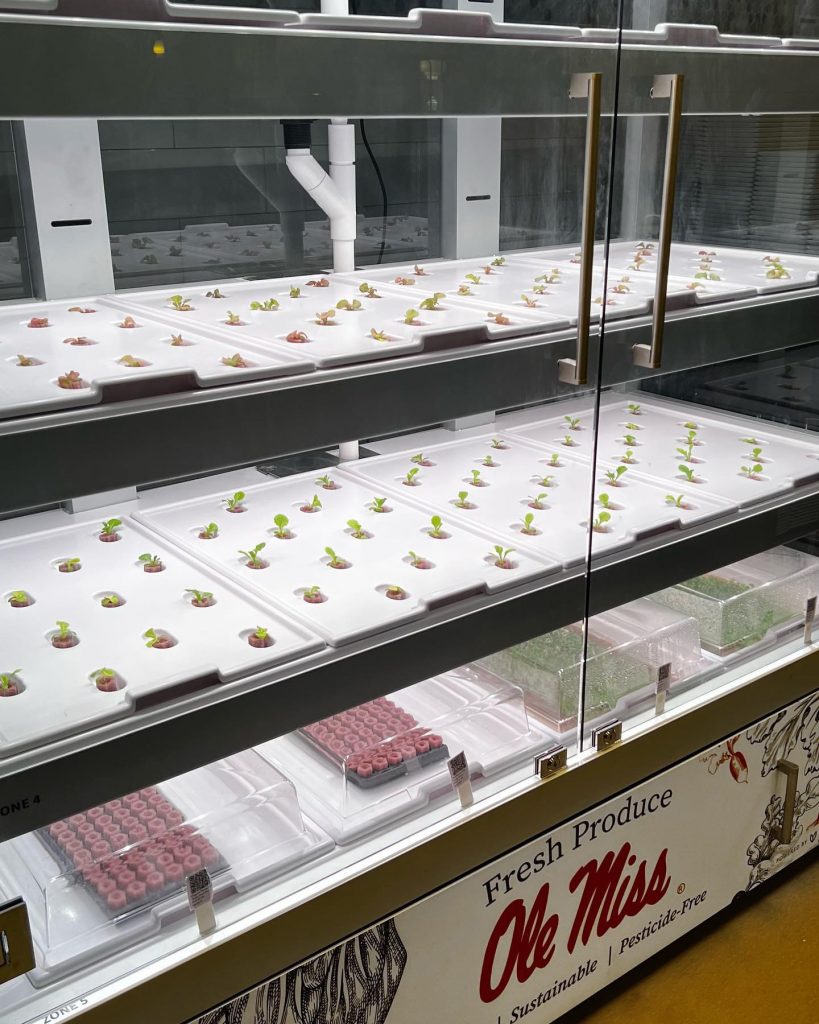
Ole Miss Dining Services staff members serve students at Rebel Market during the first week of the 2024 fall semester. The Green Restaurant Association has honored Rebel Market as a four-star Certified Green Restaurant in recognition of Dining Services' efforts to operate in an environmentally responsible manner. Photo by Srijita Chattopadhyay/Ole Miss Digital Imaging Services
Rebel Market earns highest certification level, upgrading to a four-star Certified Green Restaurant
by Marvis Herring
The residential dining and catering staff at the University of Mississippi incorporated more environmentally sustainable measures into their operations over the last year, resulting in their best-ever Green Restaurant Certification scores.

The Green Restaurant Association grades restaurants on a four-star rating system, assessing them in eight sustainability categories: energy; water; waste; chemicals and pollution; food; building and furnishing; reusables and disposables; and education and transparency.
Ole Miss Dining Services serves about 10,000 meals daily from 23 campus outlets. Rebel Market, the largest restaurant, was recertified as a four-star Certified Green Restaurant, the highest certification level, upgrading from its previous one-star grade.
The recertification score “demonstrates that we are leading by example—making a positive impact on the environment while enhancing the quality of our dining services,” said Amy Greenwood Anderson, the group’s marketing manager.
Working with the university’s Office of Sustainability, Dining Services has beefed up its waste reduction efforts and grown its composting program. This year’s score also improved thanks to a focus on carbon neutrality and sustainable purchasing, both of which earned Dining Services a national award earlier this year, said Chip Burr, resident district manager.
“The sustainable purchasing agreement that we signed with Homeplace Pastures has been a great accomplishment,” Burr said.
Purchasing beef and pork from a farm about 30 miles away, in Como, is just one of the positive steps Burr and his team have taken to improve sustainability.
Rebel Market staff grows lettuce in a hydroponic garden inside the Paul B. Johnson Commons and fresh herbs in planters outside. Reducing single-use plastics and trading plastic foam for eco-friendly boxes was also a priority, Burr said.
“If you go into the Rebel Market dining facility, you won’t find straws,” he said. “We have completely eliminated those.
“If something were to happen and the dishwasher goes down, we go to a completely sustainable product that’s compostable versus going to a cheaper, Styrofoam box, to-go box that’s going to sit in the landfill for the duration of its existence.”


Campus diners can keep the sustainability momentum rolling by simply being aware of food waste, which may mean sampling food before getting a large amount at Rebel Market.
“It is an all-you-care-to-eat facility,” Burr said. “You can eat as much as you want, but a lot of times what happens is people take way more than what they really need to sustain and then they’ll throw it away.”
Ole Miss Catering, previously a one-star Certified Green Restaurant, also improved this year to a three-star certification. The Dish, at the Luckyday Residential College, earned its first Green Restaurant Certification, receiving one star.
“What we wanted to do is really push Rebel Market as far as we could get it, and see if we could achieve that four, and then try to bring the rest of campus up to that level,” Burr said.
“The goal is, ultimately, to get them to a four as well.”



